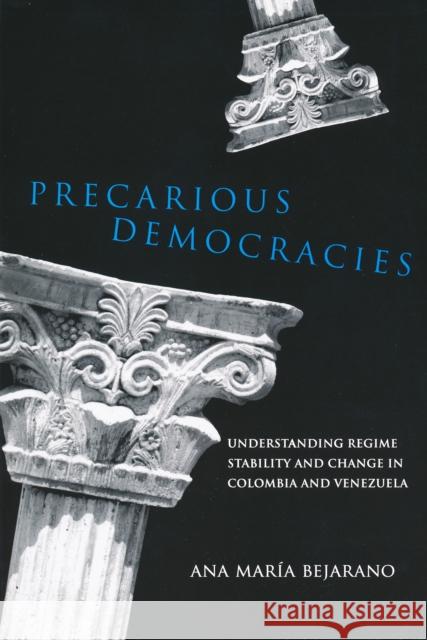Precarious Democracies: Understanding Regime Stability and Change in Colombia and Venezuela » książka
Precarious Democracies: Understanding Regime Stability and Change in Colombia and Venezuela
ISBN-13: 9780268022266 / Angielski / Miękka / 2011 / 368 str.
Why has democracy in Colombia and Venezuela evolved in very different directions? In "Precarious Democracies," Ana Maria Bejarano provides a comparative historical analysis of how the democratic regimes in these two countries have diverged, following similar transitions from authoritarian rule to democracy in the late 1950s.
Rather than focusing on resource-driven explanations, such as the role of oil in Venezuela and coffee in Colombia, or on short-term elite choices and calculations, Bejarano argues that democratic development in Colombia and Venezuela is best understood from a vantage point that privileges political history, especially the history of institutional evolution. The book makes the case that a comparative historical institutional framework--focused both on institutional legacies from the distant past (such as the state and political parties) and on those from more recent critical junctures (the foundational pacts)--provides the best lens to account for the divergent trajectories followed by democratic regimes in Colombia and Venezuela in the second half of the twentieth century.
""Precarious Democracies: Understanding Regime Stability and Change in Colombia and Venezuela" is not only an original contribution to the study of comparative politics in Latin America, but also fills a gap in understanding the complex political process of two neighboring countries that have not received sufficient academic attention. Ana Maria Bejarano's study pioneers a rigorous balance of state and party formation, types and patterns of interparty conflict, and cooperation, before moving into a detailed explanation of divergent outcomes of what Scott Mainwaring labels democratic 'transitions through extrication.' " --Gabriel Murillo Castano, University of the Andes-Bogota
"This book provides the first sustained, theoretically-guided comparison and explanation of the evolution of these two increasingly troubled democracies in South America. The strength of the book lies in its careful deployment of analysis in an historical-institutionalist tradition." --Jonathan Hartlyn, University of North Carolina at Chapel Hill











